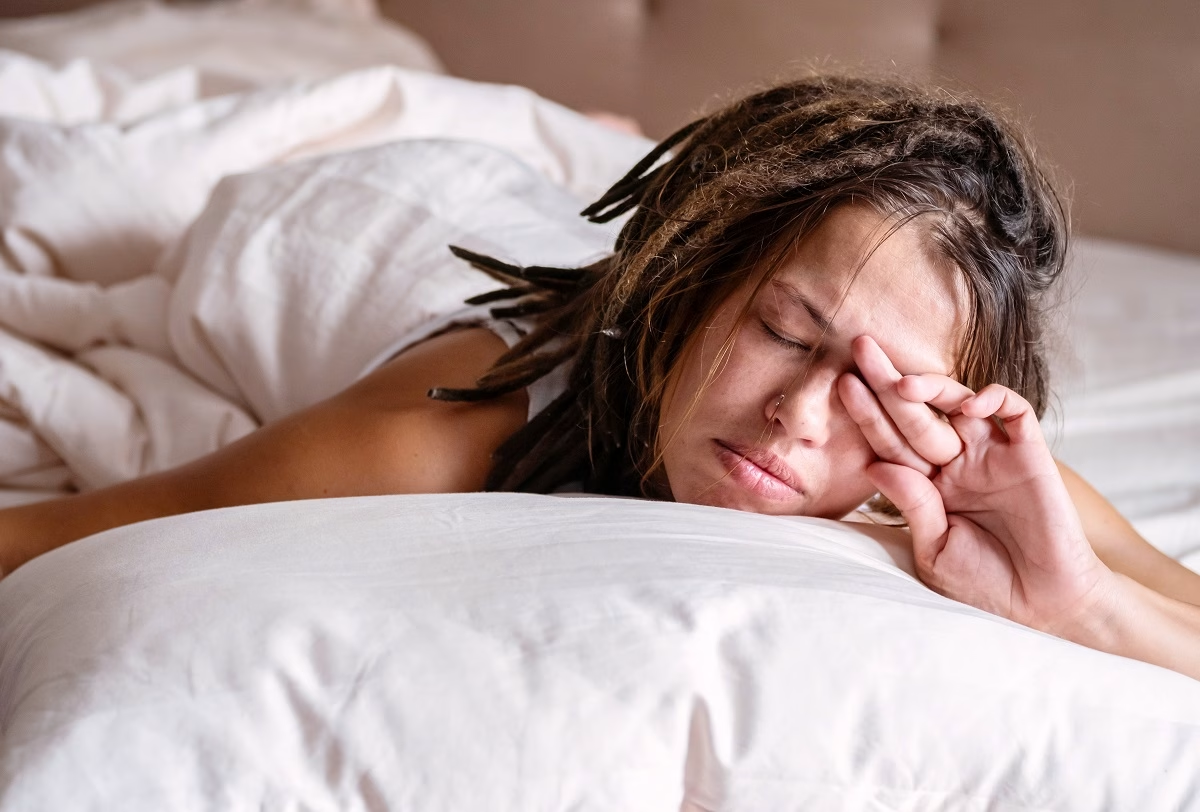A condition in which a person does not get enough sleep or does not receive quality sleep is called sleep deprivation. While this condition causes mild symptoms in short periods, long-term (chronic) sleep deprivation may lead to severe symptoms that interfere with daily routine. Moreover, individuals who experience this condition for an extended period may notice a worsening of their existing health conditions. In most cases, physicians can treat this condition.
In general, sleep deprivation may occur due to multiple reasons, but in some cases, it is a symptom of another health problem. The amount of sleep an individual needs changes with aging. Thus, it is advised to see a doctor if you notice a change in your sleep patterns, such as a gradual or sudden change without an obvious reason. Check below the healthy daily amount of sleep required by age:
- Up to 3 months of age (newborns) – 14 to 17 hours
- 4 to 13 months of age (infants) – 12 to 16 hours
- 1 to 5 years old (young children) – 10 to 14 hours
- 6 to 12 years old – 9 to 12 hours
- 13 to 18 years old (teenagers) – 8 to 10 hours
- Over 18 years old (adults) – 7 to 9 hours
Usually, people develop different forms of sleep deprivation. For instance, some people may develop this condition because of staying awake at night. In some cases, you may sleep 7-9 hours and wake up tired.
Generally, this disorder is not dangerous, but if you develop a chronic form of sleep deprivation, it may lead to serious health problems. It is also known that all people develop sleep deprivation at some point in their lives.
How Common is Sleep Deprivation?
This is a very common health condition, and it affects about 50 to 70 million people in the United States. While some people with sleep deprivation do not have symptoms, sometimes, it may indicate a more serious health condition.
What Systems are Affected by Sleep Deprivation?
This condition may negatively affect multiple systems in the body. Check below some examples:
- Heart and circulatory systems – People who develop a chronic form of this condition may experience problems with the heart and circulatory systems. These include hypertension (high blood pressure), high cholesterol (also known as hyperlipidemia), and others.
- Metabolic systems – People with chronic sleep deprivation are more prone to develop type 2 diabetes.
- Immune system – This is the natural body defense that helps protect it from viruses, bacteria, and other germs. The immune system may work less effectively in people who do not get enough sleep.
- Nervous system – It is common for people with sleep deprivation to have higher pain sensitivity (it means that you may feel pain more easily compared to a person without this condition).
- Brain – While experts do not fully understand why sleep deprivation has a very negative effect on the brain, it may impact the brain’s function and the ability to learn and remember. Moreover, some studies suggest that chronic sleep deprivation could play a role in Alzheimer’s disease.
- Mental health – Those who suffer from this condition, difficulty managing and processing their emotions. Hence, they are more likely to experience anxiety or depression.
The effects caused by sleep deprivation depend on the exact cause of the condition and how long it lasts.
What Diseases Can Worsen Because of Sleep Deprivation?
While this condition can cause multiple health problems, it may also worsen existing ones. Check below some health conditions that may worsen due to sleep deprivation:
- Obesity
- Obstructive sleep apnea
- Hypertension (high blood pressure)
- Type 2 diabetes
- Stroke
- Vascular disease
- Heart attack
- Depression
- Anxiety
- Psychosis
Symptoms
This disorder may cause multiple symptoms. Check below for the most common symptoms of sleep deprivation:
- Daytime drowsiness
- Fatigue (extreme tiredness)
- Irritability
- Difficulty focusing, remembering, and thinking
- Reduced reaction times
- Headaches
Those who develop a chronic form of this condition may experience more serious symptoms. For example:
- Microsleeps (it occurs when a person briefly falls asleep for several seconds before waking back up)
- Nystagmus (uncontrollable eye movements)
- Ptosis (drooping eyelids)
- Slurred speech
- Hand tremors
- Hallucinations
- Impaired judgment
- Impulsive behavior
If you experience any of the previous symptoms, immediately visit your healthcare professional.
Stages of Sleep Deprivation
This disorder occurs in several stages. Examples include:
- 1 – The first stage occurs when you do not sleep for at least 24 hours. The effects of this stage are very similar to being under the influence of alcohol.
- 2 – In this stage, people often experience microsleeps and may have problems with thinking or focusing.
- 3 – The third stage of sleep deprivation may cause more severe symptoms (such as hallucinations).
- 4 – This is the last stage of the condition, and it often causes very severe symptoms.
Causes
There are a lot of reasons that make sleep deprivation occur. Furthermore, most of them have to do with some circumstances in your life. Examples include:
- Misuse of alcoholic drinks
- Bad sleep-related habits (also called sleep hygiene)
- Prolonged stress
- Sleeping in new or unfamiliar places (including a hotel)
- Regularly use stimulants (such as coffee)
- Shift work (for example, if you are working partly or fully during nighttime)
In addition, sleep deprivation may also occur due to certain health conditions. Check below some examples:
- Mental health conditions
- Pain
- Insomnia (sleep disturbances)
- Degenerative brain disorders (Alzheimer’s disease, Parkinson’s disease, and others)
- Concussions and traumatic brain injuries
- Reduced quality of sleep (usually caused by sleep apnea)
- Restless leg syndrome
- Parasomnias (disruptive sleep disorders), including night terrors, sleep paralysis, sleepwalking, and others
- Certain medicines (including stimulants, corticosteroids, and others)
- Infections (such as the common cold, flu, and others)
Mental Health Problems
It is important to know that mental disorders have a major impact on sleep and vice versa. The following conditions usually negatively affect sleep. For example:
- Bipolar disorder
- Anxiety
- Depression
- Mania
- Panic disorder
- Post-traumatic stress disorder (PTSD)
- Somniphobia (fear of sleep)
What Are The Potential Complications of Sleep Deprivation?
People with this condition who do not get treatment may experience some complications. Moreover, sleep deprivation may also worsen an existing health condition. Check below some complications:
- Type 2 diabetes
- Hypertension (high blood pressure)
- Obesity
- Obstructive sleep apnea
- Vascular disease
- Stroke
- Heart attack
- Depression
- Anxiety
This document does not contain a complete list of sleep deprivation complications. However, you can consult with your doctor about ways to reduce the risk or prevent previous complications.
How to Prevent Sleep Deprivation?
It is not always possible to prevent this disorder, but you can take some steps to reduce the risk. For example:
- Manage chronic health conditions
- Quit smoking
- Limit or avoid alcoholic drinks
- Regularly exercise (it may also help get and maintain a healthy weight)
Diagnosis
Physicians usually begin the diagnosis with questions about the symptoms and medical history. However, to confirm the condition and exclude others that cause similar symptoms, they may perform the following tests. For example:
- Sleep apnea testing – Doctors may perform a polysomnogram or use an at-home sleep apnea testing device to determine whether you have this disorder or not.
- Electroencephalogram (EEG) – This is a specific test used to detect and record brain waves. It may help identify brain problems that contribute to sleep deprivation.
- Actigraphy – It uses a device similar to a watch to track sleep patterns. However, primarily, it is used to diagnose circadian rhythm disorders.
- Multiple sleep latency test (MSLT) – This test is often used to diagnose narcolepsy.
- Maintenance of wakefulness test (MWT) – Healthcare professionals often perform this test to determine whether a person can resist falling asleep when it is too easy to do so.
In addition, doctors may also perform other tests when your doctor suspects sleep deprivation.
Treatment
Unfortunately, there is no sure way to cure this condition. That’s why the treatment focuses on treating the underlying condition, reducing the symptoms, and preventing serious complications. Check below the most common treatments often recommended by doctors for people with sleep deprivation:
- Behavioral changes – It is possible to prevent this disorder by adjusting sleep-related behaviors and a pre-sleep routine.
- Medicines – It is very important to use medicines carefully because most of them are habit-forming. Discuss it with your healthcare provider for more details.
- Breathing support options – The following options are often recommended for people with sleep apnea. These include different pillows and supports, mouthpieces that adjust the jaw position, surgery to widen the airway, positive airway pressure machines that help maintain the airway open during sleep, and others.
Frequently Asked Questions
How soon after treatment will I feel better?
Usually, the recovery time differs among people with sleep deprivation. It depends on the severity of the condition, existing health problems, how long the condition lasts, and other factors. For instance, some people may recover from this disorder in one day, but others may need multiple days of quality sleep.
What is the difference between sleep deprivation and insomnia?
While both conditions are close relatives, they are not the same thing. People with insomnia are not able to sleep, but those who suffer from sleep deprivation do not give themselves enough time to sleep.
When should I go to the ER?
Immediately call 911 or go to the nearest emergency room (ER) if you experience severe symptoms because it often indicates an increased risk of heart attack or stroke. Ask your healthcare provider if you have additional questions.




